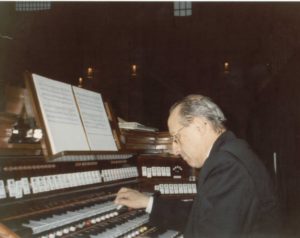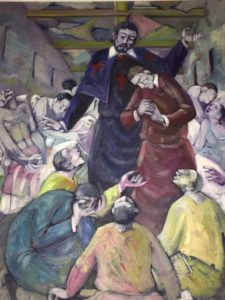
By Giovanni Maria Rossi, Camillian
I do not wish to present an exhaustive historical study: this is not my field and today, given the way things are, I cannot engage in extensive research. I just want to present some results of that little research that I have done so as to clarify further the relationship between St. Camillus and music, and to be able to draw from it further teachings that will allow us to live ‘the spirit’ of the Founder in this field as well – that ‘Spirit’ that is so well outlined in the famous book by Fr. Mario Vanti who, for that matter, in the chapter entitled ‘Renunciation’, had already referred briefly but incisively to St. Camillus’s relationship with music.
St. Camillus and Music in General
‘I like the music that sick poor people make in a hospital when many together, calling me, say: “Father, help me wash my mouth, make my bed, warm my feet”, and this is the kind of music that Ministers of the Sick should principally like’.
This is the most ‘classic’ phrase and the one that is most quoted ‘in our home’ as regards the relationship between St. Camillus and music. I think that it is worthwhile to analyse the contents and context of this phrase, in order, perhaps, to clarify its spirit in a better way.
The contents are clearly connected to a transposition of a spiritual character. But one should refer to the fact cited by historians (Vanti uses the phrase ‘was present at’ – in those days one could not do otherwise…perhaps) that Camillus had taken part in solemn vespers at one of the principal churches of Rome together with some of his religious. After returning home, one religious did nothing else but praise the music and describe the pleasure that he had felt. St. Camillus reacted (perhaps I, too, would have reacted, even though I am not a St. Camillus but a musician, in particular of the liturgy). We could interpret that phrase as follows: “Brother, do you go to vespers to listen to music or to celebrate praises of the Lord?” (even though, at that time, the epoch of the 


Instead, it is typical that Vanti puts this fact in his chapter dedicated to ‘Renunciation’. Indeed, St. Camillus explicitly refers to the ‘pleasure’ of the music of the patients, in opposition to the enjoyment (pleasure) of ‘music for music’s sake’ praised by his confrere. Here, indeed, a careful observation should be made. St. Camillus cannot agree with those who stop at what is exterior or, even worse, seek to praise the pleasure of exteriority. If we want to go even deeper, there is here something more than the ‘mortification of hearing’ to which Vanti refers; there is even a reference to the risk of idolatry. J. Gelineau, when commenting on a passage in the encyclical Musicae Sancre disciplina about art for art’s sake, writes: ‘To make aesthetic form the place where the spirit stops and rests, is to deny every other truth…Those who take a work of art as the ultimate object of their admiration and satisfaction worship nature. Art for art’s sake is idolatry’. St. Camillus, who really understood things, could only react in the face of what appeared to him to be idolatry and this was even more the case because he was dealing with a confrere.
It seems to me that I can add that at the outset reluctant but then ‘inspired’, St. Camillus had decided to open up for his religious the path of study, specifically so that they would not fall into coarseness in judgement and would be more ready to listen to their ‘neighbour’. The idolatry of music and its superficial use are, perhaps, eliminated only by study – study, naturally, organised so that better service is always provided. As St. Camillus himself wanted.





